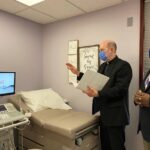A Davenport man worries that the Iowa Legislature, which opened its 2017 session this week, will enact a voter ID law that impacts people like his 90-year-old mother, who doesn’t drive. What measures would the state take to ensure that she is able to obtain an ID, he asked Democratic legislators at a pre-session “listening post.” Iowa’s secretary of state has now unveiled his proposal for an upgrade to the state’s election system, which includes voter IDs. The bigger question: is the voter ID issue honestly about enhancing fairness and eliminating voter fraud? Or will it lead to excluding the poor, the frail elderly and people with disabilities?
A LeClaire resident wonders when and how the legislature plans to fund solutions to water quality issues that Iowa voters have already said they want addressed. That question demands a response from Iowa legislators. Last year they agreed to eliminate a one-cent portion of the gas tax that had been in effect since 1989 to address removal of underground storage tanks. Couldn’t that $20 million have gone toward improving water quality? The funds certainly aren’t available in a state budget now projecting a nearly $100 million shortfall.
What about the privatization of Medicaid, which is hemorrhaging red ink? Or mental health care, which is a crying need in a state with too few psychiatric professionals? Collective bargaining and gun safety are among other issues raised at the legislative listening post. All of them, ultimately, have financial ramifications.
Elsewhere on the Opinion Page of this week’s paper is a column calling for legislators to enact an Education Savings Accounts program this year. ESAs would empower Iowa parents to choose the best and most suitable education for their children, regardless of economic standing, says Tom Chapman, executive director of the Iowa Catholic Conference.
The minimum wage is yet another issue that Iowans care about, and are divided on, as evidenced in newspaper articles and Iowa Policy Project blogs. At press time, Gov. Terry Branstad planned to share his administration’s legislative priorities for 2017. Education and the minimum wage issue may be among them.
Republicans this year enjoy a majority in the House and Senate as well as the governorship and look forward to getting bills passed that couldn’t see the light of day when Democrats were in the majority in the Senate.
Democrats now recognize the challenges they face in advancing their priorities. How does this impact ordinary Iowans dealing with any one of the above-mentioned issues in their daily lives?
Consider this: Based on Scripture and Tradition, Catholic social teaching calls us to serve the common good. As followers of the faith, Iowa Catholics have a commitment to work for the common good within the means available to them. Providing input to the Iowa Legislature is one way to do so.
Legislators at the Jan. 5 listening post in Davenport offered advice that applies to Iowans of any political or religious persuasion, from any walk of life, culture or age group. First: engage in the political process. Visit the Iowa Catholic Conference website (iowacatholicconference.org) and sign up for legislative action alerts. Consider attending the Institute for Social Action to be held Jan. 15-16 in Altoona, Iowa. To register go to iowasocialaction2017.eventbrite.com.
Get to know your legislators on a first-name basis. Read your local and diocesan newspapers to keep informed, from different perspectives, on issues that matter. Write a letter to the editor. Attend legislative forums that your Iowa legislators host on a regular basis. Get on your legislators’ email or postal lists. Become involved with organizations aligned with your interests. Search the Internet for organizations that deal with the issue you are most passionate about.
Make it personal. Legislators respond to personal stories of adversity. If your son or daughter on Medicaid has been rejected for needed treatment or experienced a delay that exacerbates his or her illness or disability, let your state representative or state senator know. Serving the common good means collaborating with others — as many did five years ago in an effort to ensure that free preschool continued to be offered in Iowa.
You may not be the 90-year-old who worries about obtaining an ID card so that she can vote. You may not be a teenager with mental illness who needs a psychiatrist ASAP. But you are Christ’s hands and feet, his head and heart, responding to needs in today’s world.
Barb Arland-Fye, Editor
(arland-fye@davenportdiocese.org)











